Wednesday, May 28 JFS~Ellen Saks lecture on mental illness
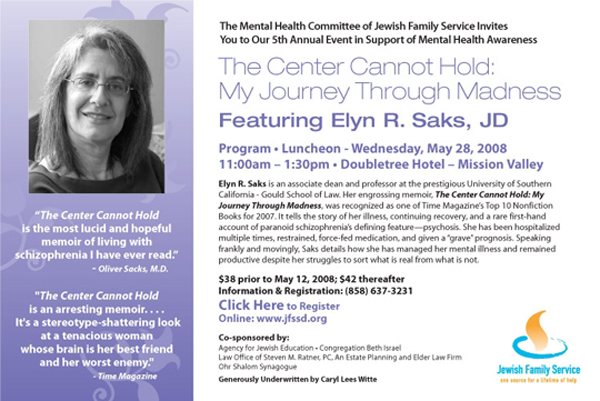

Tuesday, June 3 Guardians Golf & Tennis Tournament


Friday-Saturday, June 6-7 JFS~Judaism on the Wild Side


  
THE JEWISH CITIZEN San Diego Jewish World endorsements
Marti, Marty: Candidates giving us nachas
By Donald H. Harrison
 SAN DIEGO—There are two members of our Jewish community who are running for open seats in the June 3 eleection who deserve our support based on their records of public service. SAN DIEGO—There are two members of our Jewish community who are running for open seats in the June 3 eleection who deserve our support based on their records of public service.
Marti Emerald is a fine choice for the 7th District seat of the San Diego City Council. As a former reporter and troubleshooter for KGTV-Channel 10, she became a force in San Diego for a high standard of ethics and downright fairness in the ways that both private industry and government operate.
Her years as a television reporter, covering a multiplicity of issues, provides her with a wealth of insight both into the ways of the city, and its real needs. Moreover, she is a trained listener who knows how to pry the truth from self-serving interviewees. It will be a pleasure to watch her on the City Council using her skills to question lobbyists and other self-servers who appear before the council.
Emerald had a wonderful career in the media; she is giving it up because she feels called to public service. That’s lucky for us.
The other candidate from whom we can all schep nachas is Marty Block, who is running in the 78th Assembly District.
Block already had served two terms on the San Diego County Board of Education when he was elected eight years ago to the San Diego Community College District Board, where the membership had been bitterly divided.
No sooner was Block sworn in as a new community college trustee, then the two feuding sides elected Block to serve as their chairman—a position he has occupied ever since. His calm, reassuring demeanor brought peace to the Community College Board, enabling our elected officials to do the people’s work.
Similarly, in the Legislature, Block’s counsel will be sought by his Assembly colleagues. Here is a man who has spent 16 years as an elected official, developing solutions for the problems facing pupils from kindergarten through the first two years of college.
Furthermore, Block, an attorney, also served as assistant dean of student affairs at San Diego State for many years, making him quite familiar with the problems faced by institutions of higher education in California.
The icing on the cake is the fact that Block previously had served as the regional president of the American Jewish Committee and as government affairs chair for the United Jewish Federation.

Sunday, June 8 Temple Solel~Tikkun Leil Shavuot


THE VIEW FROM JINSA
President Bush in Mideast made us kvell
By Shoshana Bryen
 WASHINGTON, D.C.—Moving around the Middle East, President Bush was rhetorically fine, but we suspect the challenges he laid out are bigger than the regional players - or the American Congress and public - are ready to accept. WASHINGTON, D.C.—Moving around the Middle East, President Bush was rhetorically fine, but we suspect the challenges he laid out are bigger than the regional players - or the American Congress and public - are ready to accept.
In Saudi Arabia, he spoke to Americans as well as Saudis about energy prices. "Our problem in America gets solved when we aggressively go for domestic exploration... expand our refining capacity, promote nuclear energy and continue our strategy for the advancement of alternative energies, as well as conservation." But he told the King and the Oil Minister, "very plainly," according to The Washington Post, "they should be concerned about the effects of high oil prices on some of the biggest customers in the world... high energy prices are going to cause countries like mine to accelerate our move toward alternative energy."
In Israel, the President made us kvell. He rejected the appeasement that led to the Holocaust; related to Israel from its biblical roots to its 21st Century democratic and economic triumphs. "Israel's population may be just over seven million. But when you confront terror and evil, you are 307 million strong, because America stands with you."
But Abu Mazen said Mr. Bush "angered" Palestinians. He declared he no longer wants the United States as a mediator (that's OK with us) and called for "balance" in American policy. He missed the point, as usual. The United States is not - and should not be - balanced between Israel and the Palestinians.
It is a huge gift from the President to the Palestinian people to offer them, yet again and despite their ongoing war against Israel, an opportunity to join the politically civilized world. Looking forward 60 years, the President said, "Israel will be celebrating the 120th anniversary as one of the world's great democracies, a secure and flourishing homeland for the Jewish people. The Palestinian people will have the homeland they have long dreamed of and deserved - a democratic state that is governed by law, and respects human rights, and rejects terror."
Assuming he's right about what they dream of, the Palestinians had better hurry up.
In Sharm el Sheihk, Mr. Bush addressed 1,500 government and business leaders - including representatives of the Arab world - and told them what they didn't want to hear. He talked about empowering women as "a matter of morality and of basic math. No nation that cuts off half its population from opportunities will be as productive or prosperous as it could be." He talked about religious, political and economic freedom as the common right of every country and every group. He called on the Arab states to "move past their old resentments against Israel" and on the Palestinians to build institutions that would serve their people. Applause was sparse.
Unfortunately, without leadership - without the ability to make people want to do what you want them to do - it is only rhetoric. And even words that make you feel good, like the words he used in Israel, only make you sigh with the thought of what might have been.

Nancy Harrison
cruise & tour specialist
(619) 265-0808

What we imagine the Bush and Olmert families 'really' said to each other
By J. Zel Lurie
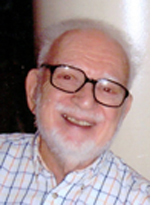 DELRAY BEACH, Florida— Here are excepts from the "transcript" of a meeting between the Olmerts and the Bushes at Ben-Gurion Airport. DELRAY BEACH, Florida— Here are excepts from the "transcript" of a meeting between the Olmerts and the Bushes at Ben-Gurion Airport.
Ehud Olmert: Welcome to Israel, Mr. President and Mrs. Bush And Shalom to the eighty-odd olim accompanying you. More American Jews have made aliya so far I n 2008 than in the entire 2007.
George Bush: I’m sorry to disappoint you, Mr. Prime Minister, but they are not immigrants. They are American Jewish leaders.
Ehud: I know. American Jewish leaders don’t make aliya.
George (smiling broadly): Of course not. Who would be left to lead if all the leaders fulfilled their Zionism by emigrating to Israel.
Ehud: Pardon me for mentioning it but your leadership of Americans has reached a record low with 71 percent in a recent poll showing disapproval. But Israelis love you 100 percent.
George: Yes. That’s why Laura and I returned here to address the Knesset. But I won’t make the mistake I did in January by crying “End the occupation.”
Ehud: That speech didn’t help my approval rating but it’s still ten points higher than yours.
George: But you still have the approval of only a minority of Israelis, while the majority love me. I wish we could trade places.
Ehud: No you don’t. Your job is secure until January 2009. Mine could be ended tomorrow by the fraud squad of the Israeli police. And I will be succeeded by a woman.
George: You mean Condi’s friend, Tsipi Livini. It seemed for a while that I would be succeeded by a woman president but I think we have escaped that fate.
Ehud: In favor of a representative of the black minority. That could not happen in Israel even though the Arab minority of 20 percent of the population is much larger than the percentage of blacks in the United States.
George: Why couldn’t it happen here?
Ehud: Over a hundred years of war between Jew and Arab has left a ball of ethnic hatred. In a poll conducted recently by a professor at Haifa University, half of the Israeli Jews said that the Israeli Arabs should not have access to the country’s natural resources.
George: That doesn’t sound like Israel’s Declaration of Independence which promised equality to the stranger within your gates.
Ehud: After 60 years, the Israeli Arabs are still far from equal. But they are fighting. An Israeli organization called Sikkuy with a Jewish and Palestinian co-directors has just published a hundred page report that shows gross discrimination against Israeli Arabs in education, housing, medicine, jobs and every other field.
Laura Bush: So why don’t the Israeli Arabs agree to exchange their homes with the Jewish settlement blocs in the West Bank. That would help you fulfill my husband’s wish for an agreement with the Palestinians before he leaves office.
Aliza Olmert: Because, Laura, their homes are where they were born and where their great-grandparents were born. They are as attached to their family homes as we Jews are attached to our ancestral home. And they are attached to our democracy, which they won’t find in any of the 22 Arab countries.
Ehud: A couple of years ago a group of Israeli Arab intellectuals, including several Arab professors in our seven famous Jewish universities, published a manifesto titled “The Future Vision of the Palestinian Arabs in Israel.” They not only called for full equality as promised in our Declaration of Independence but they had the hutzpa to propose changing Israel’s definition as a Jewish state.
George: That’s real hutzpa. The New York Times marked Israel’s Independence Day by quoting a Haifa lawyer as saying, “I’m not a Jew. So how can I be a citizen of a Jewish state?”
Ehud: Why not? Aren’t the French in Quebec loyal citizens of Canada? Don’t they maintain their own culture and language?
These rhetorical questions ended the revealing transcript. The Israeli/American secret service ushered the two couples into black bullet-proof limousines and they rode up to Jerusalem, the city of peace which has never known peace.
They followed, on a six-lane highway the ancient ancestral path of Hebrew pilgrims going up to the Temple. Laura Bush remarked how pretty the Judean Hills were covered in spring flowers, red and green against the brown earth.
On the same Wednesday, an Iranian-made rocket, fired from Gaza, crashed into a commercial center in Ashkelon, a city of 120,000, injuring over 60 persons.


A HERALD IN ZION
From would-be English girl to Israeli
By Dorothea Shefer-Vanson
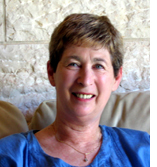 MEVASSERET ZION, Israel—Contemplating the strands that combined to form my somewhat complex and confused cultural identity as the daughter of Jewish refugees brought up in England and living in Israel, I found myself calling to mind the reading material that has accompanied me along the way over the past 60 years. I suppose you could call it a classic case of cognitive dissonance. MEVASSERET ZION, Israel—Contemplating the strands that combined to form my somewhat complex and confused cultural identity as the daughter of Jewish refugees brought up in England and living in Israel, I found myself calling to mind the reading material that has accompanied me along the way over the past 60 years. I suppose you could call it a classic case of cognitive dissonance.
As a child I learned to read very quickly. “It was as if it was all there inside her, waiting to burst out,” the teacher at my Jewish primary school told my mother. Still in the first form, I was escorted to my former kindergarten to read stories to the next generation of pre-schoolers. Reading soon became my world, my escape, my haven from the boredom of the world outside and the tedium of communicating with my peers, opening up unknown worlds of excitement, adventure and experience. Above all, it provided me with a reference group unlike any I had previously encountered, and one which seemed infinitely more attractive than the one I knew. Brought up in an orthodox Jewish household, I was all too familiar with the boredom engendered by the synagogue service and the long Saturdays when there was nothing to do and nowhere to go.
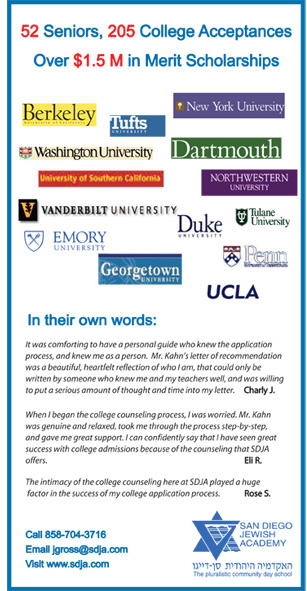 The first books to really enthrall me in those pre-TV days were the minor classics written by Enid Blyton and featuring the Famous Five. Small wonder that I, the eldest of three girls, identified with the tomboy Georgina (known as George) and yearned for a dog of my own, who would of course be called Timmy. My regular trips to the local library meant that I had soon worked my way through the oeuvre of the sainted Ms. Blyton and was progressing to Arthur Ransome’s Swallows and Amazons with its messing about in boats on the waterways of East Anglia. How English it all was, how alien to the mean urban streets I inhabited and how I yearned to have a share in it all. The first books to really enthrall me in those pre-TV days were the minor classics written by Enid Blyton and featuring the Famous Five. Small wonder that I, the eldest of three girls, identified with the tomboy Georgina (known as George) and yearned for a dog of my own, who would of course be called Timmy. My regular trips to the local library meant that I had soon worked my way through the oeuvre of the sainted Ms. Blyton and was progressing to Arthur Ransome’s Swallows and Amazons with its messing about in boats on the waterways of East Anglia. How English it all was, how alien to the mean urban streets I inhabited and how I yearned to have a share in it all.
How easy it was to be drawn into that unfamiliar world of scrumptious teas, suspicious foreigners and healthy countryside living. How I longed to spend my summer hols with cousins on a farm somewhere in Devon or Cornwall, discovering mysterious packages and deciphering obscure clues. I might as well have dreamed of flying to the moon, which back then in the 1950s was not as feasible as it might seem today. How I longed to eat scones and drink ginger ale, and what a disappointment those ‘delicacies’ were when they and my gullet finally met.
My parents took the now-defunct News Chronicle every morning, and in my thirst for reading matter that became an essential part of my daily fare. Later on the Guardian (formerly of Manchester) took its place, supplemented by the Evening Standard each evening, when my father returned from work, and the Observer on Sundays. This last played an important role in my  teenage education, and I would eagerly consume its various features and columns, its book and art reviews, at a time when the tone of the paper was far more weighty than it seems to be today, and when it did not yet come replete with glossy weekend supplements of various kinds. The art and theatre reviews were so persuasive that they convinced me, at the tender age of 14 or 15, that it was absolutely essential that I attend Shirley Bassey’s performance at the Coliseum and a production of T.S. Eliot’s esoteric play The Furies. I somehow managed to persuade some poor, unsuspecting schoolfriend to attend these with me. Then Kitchen Sink drama burst onto the scene, and although I lapped the reviews up eagerly and yearned to attend a production at the Royal Court Theatre I never actually managed to get there in person. My adolescent mind absorbed all these experiences without batting an eyelid, though obviously incapable of absorbing any but the most superficial of their messages. teenage education, and I would eagerly consume its various features and columns, its book and art reviews, at a time when the tone of the paper was far more weighty than it seems to be today, and when it did not yet come replete with glossy weekend supplements of various kinds. The art and theatre reviews were so persuasive that they convinced me, at the tender age of 14 or 15, that it was absolutely essential that I attend Shirley Bassey’s performance at the Coliseum and a production of T.S. Eliot’s esoteric play The Furies. I somehow managed to persuade some poor, unsuspecting schoolfriend to attend these with me. Then Kitchen Sink drama burst onto the scene, and although I lapped the reviews up eagerly and yearned to attend a production at the Royal Court Theatre I never actually managed to get there in person. My adolescent mind absorbed all these experiences without batting an eyelid, though obviously incapable of absorbing any but the most superficial of their messages.
Comics also featured prominently in my childhood reading matter. Together with the Jewish Chronicle and various women’s magazines (more about them later), my father would bring home several children’s comics each Friday after work, doubtless out of a desire to gain a few moments of peace and quiet after supper. Do Dandy and Beano still exist, and are Desperate Dan and Tin Lizzie still engaging in weird and wonderful exploits? And is there honey still for tea?
That reading matter projected a slightly different view of the England I yearned to inhabit. Japes and capers of all manner abounded, my favourite being the one that involved stretching some string across a path to trip up old ladies. This seemed a very enticing project to my nine-year old mind. I remember suggesting that I undertake this one April Fools’ Day, the intended victim being the white-haired refugee we knew as ‘Auntie Grumer’ to whom my parents sub-let part of our house in Kilburn. But to my chagrin my parents vetoed my idea, which seemed perfectly reasonable to me at the time. It was the first of April after all.
I was also presented with a more high-minded comic for girls called Girl. I did not know it at the time, but its publisher was an Anglican minister. How I lapped up the stories it contained, especially the serialised exploits of beautiful, fair-haired Belle of the Ballet and the evil, dark-haired girl who was her enemy. How wonderful it was that Belle somehow always managed to prevail over the schemes that her rival concocted, so that it was she who was ultimately given the leading role in the grand production, while her dark-haired nemesis skulked in the back row of the corps de ballet. My well-intentioned father was apparently unable to see beyond the seemingly innocent surface message to the Christian missionary subtext that underlay that particular publication. By some miracle almost akin to transubstantiation, I identified wholly with the fair heroine rather than with the dark-haired girl who resembled me far more closely.
Soon afterwards schoolgirl stories and annuals began to grab my interest, whereupon my yearnings for acculturation and assimilation took a different turn. Why, oh, why didn’t my parents send me to a boarding school, where I could get into scrapes, taunt the resident Mademoiselle and share the camaraderie of girls together? How I longed to possess a tuck box, play hockey, possess a nickname and partake of all the delights that dormitory life had to offer. It did not, of course, cross my mind that I would be singled out as different before I even set foot in the place, that I would miss my family terribly and that because of dietary restrictions I would not be able to eat a thing.
As the years passed and I became a teenager my tastes became a trifle more sophisticated. Thackeray, Dickens and other classics were supplemented by the magazines my father brought home for my mother each Friday night, Woman, Woman’s Own, and of course the family subscription to the Readers’ Digest plus, eventually, those wonderful tomes of the Readers’ Digest Condensed Books (five condensed books in each volume).
A word is in order at this point about the world that Woman and Woman’s Own created in the 1950s. Anyone who grew up in the England of that time, when TV had only one, or at most two, channels, both of them black and white, when the Conservatives were in power and it looked as if that would always be the case, must recall the closed nature of society in those days. It was a time before massive immigration turned England into a cosmopolitan, multi-cultural society. It was a world where people, especially women, still knew their place and were happy to remain there, where every teenage girl eagerly awaited her first date and her first kiss, where the maximum in the way of a career that a woman could aspire to was a job as a secretary, a nurse, or an air hostess. Besides, all that was a mere prelude to what was in fact the ultimate goal of every woman, this reader included, namely, to marry the boss, or at least the decent English boy next door, and live for ever in a sweet little house with roses growing round the front door.
And then it would be the desire and purpose of one’s life to produce a brace of fair-haired children, cook nourishing dinners , bake cakes as prescribed by the ‘Wooden Spoon Club’ while sewing ourselves shirtwaister dresses and knitting warm cardigans for our offspring. I must admit, to my shame, that that was the life to which I aspired for many of my formative years.
Another important influence on my growing mind was exerted by the novels of P.G. Wodehouse. Every summer my parents rented the same house in Bognor Regis for a few weeks. The house belonged to a lady with an extensive library, among them almost every book ever written by P.G. Wodehouse. It was there, on those long, rainy days beside the sea, that I was introduced to the even more exotic world of Wooster and Jeeves, weekends at country houses, maiden aunts, Blandings and prize pigs. I gurgled merrily at the strange goings on in those far-off places, and hoped that one day I, too, would be able to be part of that world.
What precisely that world consisted of was a strange and wonderful muddle of every possible stereotype of English society that my eclectic reading had fashioned in my mind. Not even in the England of the 1950s did anything remotely resembling that world actually exist, but how was I to know that, cut off from the reality of life, deeply ensconced in the world of books and magazines?
The rude awakening from this world of illusion was a gradual process. It started after I passed my 11 plus exam and went to a respectable girls’ grammar school. At first I managed to cling on to my dream, but with the passage of time even my clouded little brain began to realise that something was amiss. There was no statistical fit between the world I had imagined to exist out there and the reality of daily life.
My main ambition upon entering those lofty Victorian portals had been to distance myself as far as possible from the other Jewish girls, and to be accepted as ‘one of them’ by the Gentile girls in my class. Yes, tall, blonde Frances Tweed agreed to come to my house and even invited me to her birthday party, and yes, she and one or two others actually picked me to be on their netball team at the games field. I was even finally granted one of my most fervent wishes, and a nickname was duly bestowed upon me. I was dubbed ‘Drip.’ I was so proud. It fitted me exactly, I thought. I was short and slight, and my prowess on the netball court was nothing to write home about. Drip was a very fitting name I felt in my ignorance of the negative connotations of the word..
The Jewish girls did not attend Assembly in the school hall with which each day began, except on Fridays. There were rather a lot of us (about one third of all the pupils), and we held our own ‘Jewish prayers’ in the music room. Some sixth-formers were in charge of us, and we first- and second-year girls were in great awe of them. After saying our prayers and listening to someone reading passages from the Bible, we were called into the school hall to hear the headmistress reading out the daily announcements. That was the moment I had been waiting for. I declined to stand at the back with the other Jewish girls, preferring to shake off my Jewishness and mingle with the Christian girls.
At first this seemed to go quite well. It was some time before I realised that my non-Jewish friends, Frances and Shirley, Anne and Julia, were not in fact smiling at me, were actually edging away from me, perhaps even laughing at me. The penny was beginning to drop. I was not being called ‘Drip’ out of affection. I was not really wanted. I was not one of them after all. I was different. I was Jewish. The fact that several of our teachers tended to refer to us as ‘you people’ did not exactly help matters. I began to stick to my Jewish friends.
My reading also took a different turn. Essays and plays seemed to be more interesting and stimulating than novels. James Joyce’s Ulysses, anything written by Freud or Oscar Wilde, Colin Wilson’s The Outsider and James Fraser’s The Golden Bough were far more engrossing and stimulating than anything I encountered at school. My reading was nothing if not eclectic. A chance encounter in the local library with a biography of Orde Wingate set me on the path towards Zionism. Alma Mahler’s autobiography was confiscated from me by my English teacher when she found me reading it under the desk during one of her lessons. Being slightly more enlightened than most of her colleagues, she handed it back to me at the end of the class with an understanding look.
It was then that I began to realise that I too was an outsider, and that that was a perfectly legitimate thing to be. Many of the people I most admired had regarded themselves as outsiders; and they were creative people, troubled people, restless people, people who did not feel rooted to the place where they happened to have been born. I was an outsider, and proud of it.
Soon after graduating from London University I moved to Israel, where I have lived ever since. In my first year, while attending the Hebrew University in Jerusalem, I founded the Rootless Jewish Intellectuals’ Society. It had three members, one Australian, one American and myself. We would meet for coffee between lectures and talk about this and that. It was very fulfilling. The society petered out as we drifted apart. I don’t know what has become of the other two, but I’m still in Israel, which is in fact an ideal stamping ground for people like me.
We children of refugees will always be outsiders, because it is a condition that is entrenched within us. My solution is that I have abandoned the desire to fit in, to conform, to be one of them. I have come to the conclusion that that is mission impossible. I am content to be myself. I have no desire to eradicate my differentness from my character. And it is only now that I have acknowledged this that I can come to terms with the troubled child that I once was and make my peace with the world.
Born and brought up in England, the author is a free-lance writer and translator living in Mevasseret Zion, a suburb of Jerusalem. The article originally appeared in 'Second Generation Voices.'
< BACK TO TOP


'Blue' songs detract from Jewish anthology
The Jewish Songbook "The Heart And Humor Of A People" Shout! Factory,
produced by Brooks Arthur $15.98
By Eileen Wingard
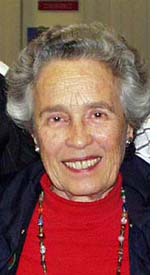 SAN DIEGO--Brooks Arthur, Grammy-winning producer, dreamed of assembling a contemporary collection of what he considers "quintessential Jewish songs from his childhood upbringing in Brooklyn, NY." On this CD, he features performances of "classic" Jewish songs sung by some of SAN DIEGO--Brooks Arthur, Grammy-winning producer, dreamed of assembling a contemporary collection of what he considers "quintessential Jewish songs from his childhood upbringing in Brooklyn, NY." On this CD, he features performances of "classic" Jewish songs sung by some of
today’s top Jewish stars.
Of the thirteen tracks, there are three that stand out. Neil Sedaka’s rendition of "My Yiddishe Momme" is deeply touching. His Yiddish is authentic and his voice resonates was heartfelt emotion. I was particularly teary-eyed as I listened to the lyrics which so well describe my own Yiddishe Mamme, Rose Schiff, who died last February.
An outstanding arrangement of "Sabbath Prayer" from Fiddler On the Roof featured the beautiful voices of Theodore Bikel and Betsy Hammer. I have always been a great fan of Bikel, a versatile actor-singer who was in the forefront of the folk song revival and distinguished himself as Tevye in the
Broadway production of Fiddler.
Finally, Barbra StReisand singing Max Janowski’s "Avinu Malkeinu" is a true spiritual experience, Barbra at her best.
But beside such sacred gems, Brooks Arthur includes among his humorous selections "Mahzel" with its obscene language, and "Joe and Paul" with its joking references to masturbation and prostitution. It all may have played well in the Catskills, but this is not a CD I can recommend for a Bar or Bat Mitzvah
gift or as a present for one’s mother, if yours is anything like mine was. The
combination of sacred and profane is in bad taste.
Sure, I have a cousin who relishes her repertoire of "dirty jokes" and she might enjoy those tracks. Many of us are tickled by "off color" humor. But to include such vulgar language in a CD calling itself The Heart and Humor of A People and considering these part of "a distinct collection of timeless songs
reminiscent of the beauty, creativity and joy within Jewish culture" is unacceptable.
There is so much Jewish humor that could have been included. Allan Sherman’s “Shake Hands With Your Uncle Max” sung by Jason Alexander on track 6 is a good example. I wonder if the artists on the other eleven tracks were aware of the lyrics of "Mahzel" and "Joe and Paul" and approved of them. I wonder if the Jewish Federations who will receive 50% of the proceeds from sales of these CDs have reviewed their content.
There are several instrumental tracks, versions of "Raisins and Almonds" with Dave Koz on solo saxophone, "Mein Shtetele Belz with Herb Alpert on trumpet, and Marvin Hamlisch’s jazzy piano version of "Hatikvah." The CD opens with "Utt Da Zay" by the Manhattan Transfer featuring Andy Statman’s terrific clarinet playing. The title is better transliterated "Ot Azoy" or "Ot Azay." Not sure how "Da" got into it. As for Adam Sandler’s "Hine Matov," I wish he had learned to pronounce Hebrew better. Oh well.
< BACK TO TOP


ADVENTURES IN SAN DIEGO JEWISH HISTORY
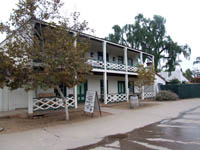
Robinson-Rose House
|
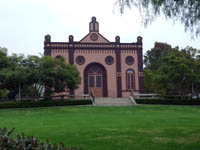
Old Temple Beth Israel |
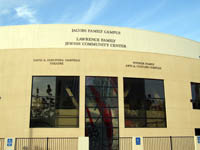
Lawrence Family JCC |
Editor's Note: We are reprinting news articles that appeared in back issues of various San Diego Jewish newspapers. You may access an index of the headlines of those articles by clicking here. You may also use the Google search program on our home page or on the headline index page to search for keywords or names.
Community Currents
From Southwestern Jewish Press, July 21, 1950, page 2
By Albert Hutler, Executive Director, United Jewish Fund
How much money is raised by Jewish organizations in San Diego for local, national and overseas needs is a question which has been asked by many. It might be worth while to make a study of how much money each organization raises for its own purposes. I wager we would find this most enlightening.
Sitting here and writing this column gives me an opportunity to make an estimate. I would place it at about $435,000 raised by Jewish organizations in San Diego in 1949, of which $205,000 was raised by the United Jewish Fund.
Local organizations working for national and overseas agencies outside of the Fund, raised about $25,000, with Hadassah being the leader. Local organizations working for local needs, such as the Old Folks Home, and our religious institutions, including the capital funds, raised about $200,000 in that year, the bulk of which is payable over a ten-year period. The balance of money raised is out of the merchant's pockets in dribs and drabs to "itinerate" collectors.
Along these lines merchants are asked to beware of a surge of Ad Books for local organizations who need money for various objectives, both good and bad; influx of itinerate collectors who very often get 40 or 50 percent of the take, and various "outlaw" campaigns. It is suggested that you save your money by calling the Fund Office for information about any organization which approaches you.
Cooperation continues between Welfare Agencies under the Federation setup. When Council House closed because there was no further need for it, there was one elderly couple for whom proper housing could not be found. The officers and the director of the San Diego Hebrew Home for the Aged agreed there was room in the Home for this elderly newcomer couple. They are there now on a temporary basis. Here's another example of cooperation on the local level. Perhaps some of our organizations can take a lesson from this type of community coordination.
About once a week we get a question as to how many Jews there are in San Diego. Well, let's figure it out. There has never been a survey made, though one is planned for the fall. There are certain statistical methods of figuring population. About 650 individual families belong to the three synagogues. That indicates that about 2,000 men, women and children are members of the synagogues in San Diego. The usual estimate is about 50 percent non-members, which means approximately another 2,200 who are not affiliated.
Let's look at it another way. The United Jewish Fund has about 2,300 names on its files, of which 1,600 are individual families. Figuring about 3.1 to every Jewish family you come up with a figure of 4,960. Add to that the several hundred families we know nothing about and yet get a figure of between 5,000 and 6,000 Jews in San Diego. Maybe now our phone will stop ringing with this request.
{Return to top}

SAN DIEGO JEWISH WORLD THE WEEK IN REVIEW
Donald H. Harrison in San Diego: Diplomacy, art and food were mainstays of Israel festival at Lawrence Family JCC
Dov Burt Levy in Salem, Massachusetts: Sabbatical shalom: No, it's not a misspelling
Sheila Orysiek in San Diego: A life story contained in six boxes
Adventures in San Diego Jewish History: What was the Jewish community news in 1950? Who were the newsmakers? Our archives answer these questions in daily installments
Donald H. Harrison in San Diego: Night on Churchill—er, Dizengoff—filled
with new sights and shoulder movements
Natasha Josefowitz in La Jolla, California: What to do with those old family photos
Rabbi Baruch Lederman in San Diego: The Rosh Yeshiva and a Hebrew Christian; story by Yair Hoffman
Rabbi Leonard Rosenthal in San Diego: Starting Jewish studies even as an adult
Ira Sharkansky in Jerusalem: Retaliation in Gaza may be a matter of political timing after Bush, Pelosi visits
Adventures in San Diego Jewish History: What was the Jewish community news in 1950? Who were the newsmakers? Our archives answer these questions in daily installments
Ulla Hadar in Kibbutz Ruhama, Israel: The daily hell on Israel's side of Gaza line
Donald H. Harrison in San Diego: Walk through 4 centuries of S.D. history
Sheila Orysiek in San Diego: Chapter Eight in the serialization of her novel, Reluctant Martyr
Adventures in San Diego Jewish History: What was the Jewish community news in 1950? Who were the newsmakers? Our archives answer these questions in daily installments
Donald H. Harrison in San Diego: SDJA 10th grader breaks CIF seasonal strike out record, besting even David Wells' mark
Rabbi Dow Marmur in Toronto: Gay clergy issue prompts some Canadian congregations to leave United Synagogue
Hal Wingard in San Diego: His songs, "Sara," "Makhtesh Ramon," and "At the Jerusalem Wall"
Adventures in San Diego Jewish History: What was the Jewish community news in 1950? Who were the newsmakers? Our archives answer these questions in daily installmentsGarry Fabian in Mebourne, Australia: Australia notes Yom Zikaron, Yom Ha'Atzma'ut with various ceremonies ... Australia looks to Israel for innovation inspiration ...AJAX in racial slur row ... Anti-Semitism rife among Sydney's Muslim youth ...Jewish troops honoured ... Yom Hashoah in the Australian capital ..Huge crowd in Brisbane ... Students remember Anzac courage ... Lighting the way for Prime Minister ... Liberal staffer sacked over anti-Semitic remarks
Donald H. Harrison in Chula Vista, California: XLNC-1, TICO helping tore-popularize and internationalize classical music
Ira Sharkansky in Jerusalem: Intolerable situation on the Gaza border
Adventures in San Diego Jewish History: What was the Jewish community news in 1950? Who were the newsmakers? Our archives answer these questions in daily installments
Link to previous editions
< BACK TO TOP
|
